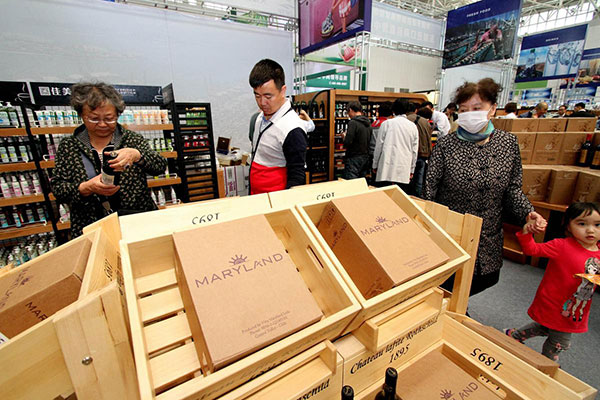Tianjin FTZ pushes for building of free port

Customers purchase imported alcoholic drinks at a direct sales shop in the Dongjiang bonded zone in Tianjin. [Photo/China News Service]
Tianjin, a coastal city in northern China, is stepping up its efforts to build a high-standard pilot free trade zone and apply for the establishment of a free port to further drive the joint development of the Beijing-Tianjin-Hebei region, the zone's administration said.
In an email interview with China Daily, the administration revealed that it has, following detailed research and discussion, drafted and revised the construction plan of the Beijing-Tianjin-Hebei free port, which would further integrate regional development.
The plan will be submitted to the higher authorities "in due course", it said. If it is approved, the blueprint for the free port would serve as a platform for the region to open further to the outside world.
A free port is set up within a country or a region's borders but is outside its customs' supervision. It is open to all commercial vessels on equal terms. Goods may be unloaded, stored and shipped without the payment of customs duties.
A free port needs specially designed policies in terms of market access, financial systems and taxation, said Wei Jianguo, vice-president of the China Center for International Economic Exchanges.
Earlier in 2016, a 10 billion yuan ($1.44 billion) government-backed fund was set up to promote the development and integration of the Beijing-Tianjin-Hebei region.
The China (Tianjin) Pilot Free Trade Zone was set up in 2015. More than three years on, the zone has made significant advances.
Peng Zhiwei, director of the department of international economics and trade at Nankai University, said the Tianjin FTZ has made several breakthroughs in terms of institutional reform, investment promotion, trade liberalization, and the innovation of financial systems.
By the end of October, the zone had carried out 60 percent of the 128 pilot tasks outlined in an earlier overall plan.
Concrete measures have also been taken in the zone to facilitate trade and investment, offering a one-stop service to companies. The average customs clearance time has been cut from up to two days to two hours. In addition, customs clearance costs have been reduced by 70 percent, and logistics costs by 30 percent.
Since it was launched, the FTZ has attracted 2,353 foreign companies, with total registered capital of 433.1 billion yuan.
For instance, Airbus China, located in the Tianjin pilot FTZ, signed a framework agreement in January with its Chinese partners to increase local production.
Vice-Minister of Commerce Wang Shouwen said China is gradually shifting from high-speed to high-quality growth, and that there is huge market potential. The country welcomes multinationals to seize growth opportunities in the Chinese market.
Wang made the comments at the 11th International Roundtable of Multinational Leaders. The conference, held earlier this month in Tianjin Binhai New Area, brought together government officials and business leaders to discuss the opportunities and challenges that lie ahead.
Invest in China Copyright © 2026 China Daily All rights Reserved
京ICP备13028878号-6
 京公网安备 11010502032503号
京公网安备 11010502032503号





